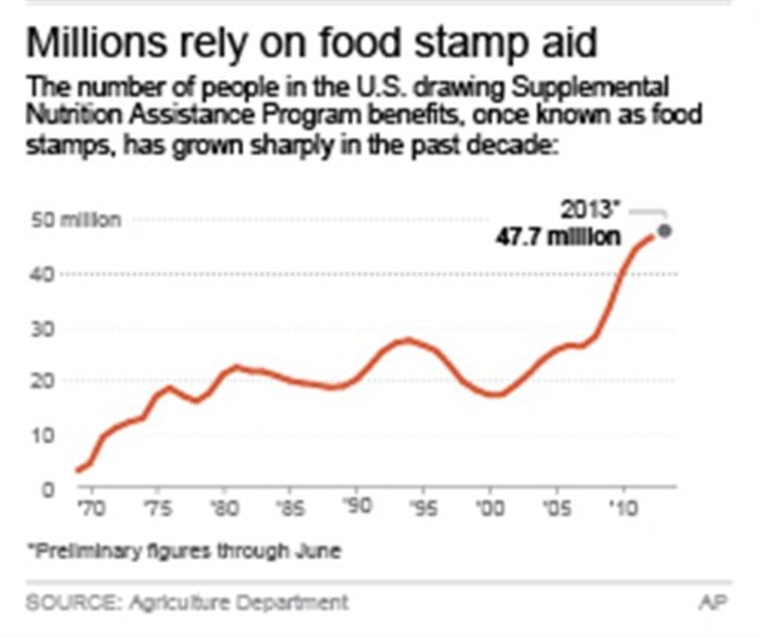
By Frank Thorp and Carrie Dann, NBC News
With only Republicans voting in support, the GOP-led House passed a bill Thursday to reduce spending for food stamps by $39 billion over 10 years.
The vote was 217-210. No Democrats voted for the measure.
Fifteen Republicans voted against the bill, which the Congressional Budget Office estimates will result in the loss of benefits for an estimated 3.8 million people in 2014.
The bill now goes to the Senate, where a bicameral panel is expected to drastically reduce the amount of cuts to food stamp programs when lawmakers meld it with the legislation passed in the upper chamber.
Republican leaders dispute that the bill “cuts” nearly $40 billion from the Supplemental Nutrition Assistance Program (SNAP) saying it instead eliminates loopholes that have allowed ineligible Americans to continue receiving the benefits.
Many rank-and-file Republicans say that while the SNAP reductions may be deep, they see the food stamp bill mostly as a starting point to blend with the Senate’s version of the legislation, which would result in much more moderate cuts.
But some in the GOP think the food stamp reductions go too deep.
"I just think on balance it's not a good bill," said Rep. Peter King, R-N.Y. who intends to vote against the measure. "Against the whole backdrop of a government shutdown, I just think it's too much."
House Democrats have excoriated the Republican plan.
"A very, very substantial number of families in the richest country on the face of the earth will be adversely affected by the bill, and I expect Democrats to oppose it overwhelmingly," House Minority Whip Steny Hoyer, D-Md., said. "It again is carrying out the agenda of the most hardline factions of the Republican Party."
Wielding a steak, a bottle of vodka and a can of caviar on the House floor, Democratic Rep. Jackie Speier said Republicans who support the cuts are the beneficiaries of generous stipends for overseas travel.
"They somehow feel like crusaders, like heroes when they vote to cut food stamps," she said of GOP backers of the cuts. "Some of these same members travel to foreign countries under the guise of official business. They dine at lavish restaurants, eating steak, vodka and even caviar."
In July, Republican leadership announced they would split the food stamp provision from the full Farm Bill after the unexpected -- and embarrassing -- failure on the Republicans' bill on the House floor on June 20th. Democrats blamed provisions that implemented work requirements for those receiving food stamps, as well as the $20.5 billion in cuts to the program, for not supporting the bill as Republicans had expected.
In today's bill, Republicans doubled down on the work requirements, as well as almost doubled the number of cuts (from $20.5 billion to $39 billion), so that they could get enough Republicans to pass this bill without Democratic votes.
Another provision would toughen work requirements for food stamps, specifically for "able-bodied adults without dependents" between the ages of 18 and 50.
The House bill will require states to only give food stamp benefits to beneficiaries in this group if they obtain employment, participate in job training activities, or perform voluntary community service actives in exchange for those benefits.
The CBO estimates that provision will result in 1.7 million people losing benefits in 2014, and an average of 1 million people losing benefits per year over the next 10 years.
The budget agency also calculates that the number of food stamp recipients will be reduced dramatically over the next 10 years, from 48 million in 2014 to 34 million in 2023. But those changes would be due not only to the Republican bill, but an economy expected to rebound during that time.